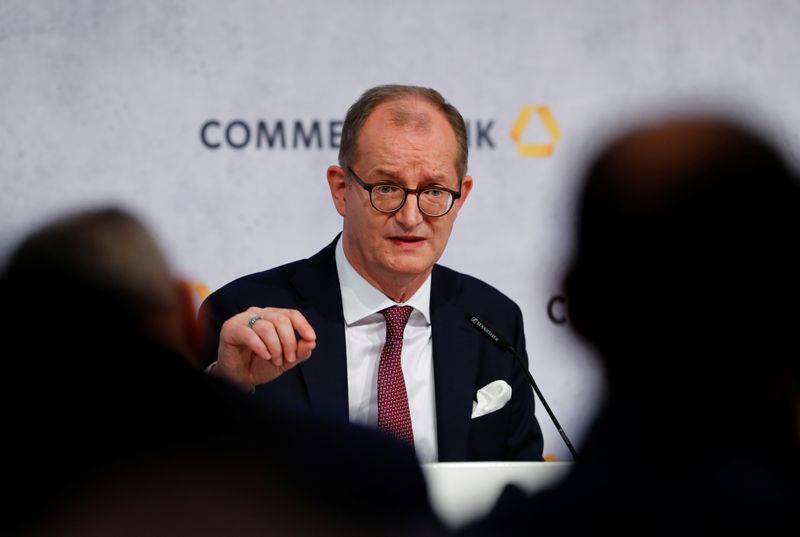By Tom Sims and Hans Seidenstuecker
FRANKFURT (Reuters) - Commerzbank's (DE:CBKG) chief executive and chairman were under pressure from activist investors to axe jobs, but they decided to go first after a damaging clash with unions last week, sources close to the situation told Reuters.
With nearly 12,000 jobs at stake, a quarter of the Commerzbank workforce, divisions came to a head when labour representatives blocked a supervisory board meeting to discuss the future of Germany's second largest bank.
Although precipitated by a public campaign for change by U.S. activist investor Cerberus, one of its top shareholders, the sudden resignations of both CEO Martin Zielke and chairman Stefan Schmittmann came as a shock.
Even Cerberus, which has called Commerzbank "disastrous", had wanted an orderly transition, firstly with changes to its supervisory board, and then to its management.
But behind the scenes, unions were working on their own separate resistance campaign. This played a significant role in the upheaval, interviews with those involved and documents show.
Union officials, irate that Commerzbank's management refused to provide them with documentation to prepare in advance of a supervisory board meeting, cried foul and got it called off.
"Not in our name! Why Verdi got a supervisory board meeting postponed", the union said in a two-page flyer to employees.
While underscoring the enduring power of organised white-collar labour in corporate Germany, the episode has also prompted some of Commerzbank's biggest shareholders to call privately for improved dialogue with the unions, whose representatives make up half of corporate boards.
One of Commerzbank's top shareholders believes Zielke and Schmittmann had a bad track record working with staff, and that this must change, a person with direct knowledge of the investor's thinking said.
"This is a chance to restart the relationship."
A person close to Zielke and Schmittmann said that they did their best to work with labour, but 40 different works councils at Commerzbank, each with competing interests, complicated this.
"There were too many open flanks," a boss of the Verdi union, Jan Duscheck, said after the resignations, citing unruly investors and job cut proposals. "In the end, the conflict with Verdi and the works councils came to a head."
'DOOMED TO FAILURE'
For Stefan Wittmann, a Verdi union official who sits on Commerzbank's supervisory board, the issue is not so much about job cuts but the strategy the bank has for those who remain.
"A strategy against the interests of the workforce is doomed to failure," Wittmann told employees.
The sudden departure of Commerzbank's top management duo means that a board meeting planned for Wednesday is more likely to focus more on its leadership turmoil than its strategy.
It had promised to publish a strategy review by August at the latest, but the timing is now an open question.
"Commerzbank can't afford a drawn-out power vacuum ... A successor for Zielke must be found quickly," Andreas Thomae, a portfolio manager at Deka, a top-10 investor in Commerzbank, said of the rare dual resignation.
While it was Zielke who first broached resignation, this got Schmittmann thinking about his own future, the chairman told employees in an intranet post seen by Reuters.

"If the coach of the team leaves, then you also have to ask yourself as 'club president' if his evaluation of the situation applies to you as well," Schmittmann said.